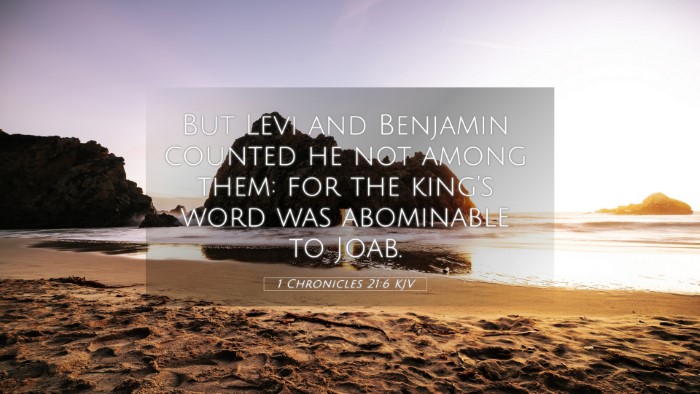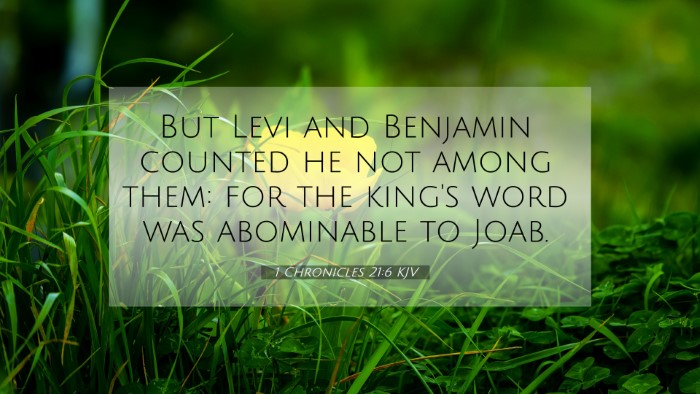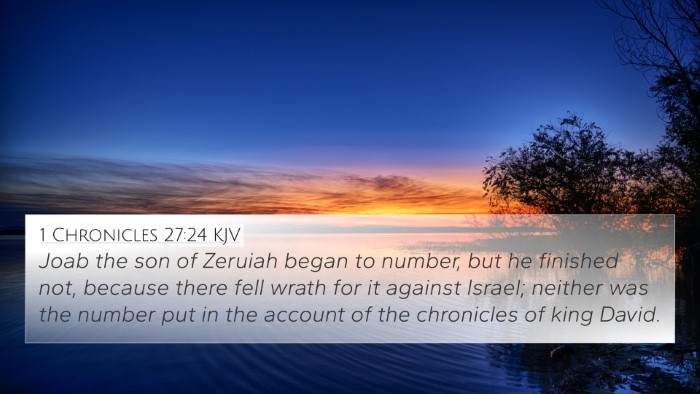Understanding 1 Chronicles 21:6
1 Chronicles 21:6 states, "But he did not number Levi and Benjamin among them, for the king's command was abhorrent to Joab."
Verse Meaning and Context
This account discusses King David's decision to conduct a census of Israel, which was met with resistance from Joab, the commander of his army. The reluctance to include the tribes of Levi and Benjamin in the counting process speaks to deeper themes regarding divine guidance, sin, and the implications of leadership decisions.
Insights from Public Domain Commentaries
-
Matthew Henry:
Henry highlights that Joab's objection to the census reveals both his loyalty to tradition and the potential folly of David's command. Joab knew that census-taking could evoke God's wrath, as seen in previous instances recorded in the scriptures.
-
Albert Barnes:
Barnes points out that the omission of Levi and Benjamin indicates a respect for the sacredness of the Levites, who were set apart for the service of the Lord. This detail signifies the acknowledgment of different roles within the community of Israel and the recognition of divine order.
-
Adam Clarke:
Clarke elaborates on the potential implications of David’s actions, expressing concern that David's desire to count might stem from pride or a lack of faith in God's providence. He cautions against measurements of strength that neglect reliance on God.
Thematic Connections
The message of 1 Chronicles 21:6 resonates with themes of pride, leadership, obedience, and divine authority. It provides an opportunity to explore:
- Sin of a Census: The act of numbering the people as a display of power rather than gratitude is a recurring warning in scripture.
- The Role of the Levites: Their unique purpose is affirmed despite the counting, emphasizing God’s specific call for service.
- Leadership Accountability: Leaders may feel compelled to measure success or ability by quantifiable means; this verse serves as a reminder of the spiritual implications of such actions.
Cross-References
This verse can be related to various other scripture passages that illustrate similar themes. Here are some significant cross-references:
- Exodus 30:12: Discusses the consequences of a census and the requirement of atonement.
- 1 Samuel 15:22: Highlights obedience over rituals, reinforcing the importance of following God's command above personal desires.
- 2 Samuel 24:10: Captures David's remorse after the census as an act of sin against God.
- Numbers 1:49-54: Discusses the role of the Levites and their exemption from military service.
- Luke 14:31: Relates to counting the costs before embarking on significant undertakings, offering contemporary parallels to leadership decisions.
- Psalms 20:7: Speaks of trust in God versus reliance on material strength or numbers.
- James 4:10: A reminder to humble oneself under God's might, linking personal humility against prideful actions of counting.
Connecting Themes and Tools for Study
Understanding the implications of this verse invites the use of various Bible cross-reference guides and tools for Bible cross-referencing. By utilizing a bible concordance or a cross-reference Bible study, readers can identify connections between this passage and broader biblical themes. The following resources can help:
- Cross-Reference Bible Study Methods: Techniques to encourage linking related scriptures for deeper understanding.
- Bible Reference Resources: Compilation of scriptures that reference similar stories of faith, obedience, and the role of leadership.
- Comprehensive Bible Cross-Reference Materials: Tools that highlight detailed cross-references, enhancing thematic studies.
Application and Reflection
Reflecting on 1 Chronicles 21:6, believers are moved to consider the implications of counting and relying on tangible measures of success. How do we assess our position or value in the eyes of God? This verse serves as a poignant reminder that our worth isn't found in numbers or achievements, but rather in our faithfulness and obedience to God’s commands.
As you explore this passage, consider asking yourself:
- What areas of my life am I counting or measuring instead of trusting God?
- Am I recognizing the unique roles in my community or church as God defines them?
- How can I remain humble in leadership and service, acknowledging God’s authority over my decisions?
Conclusion
In summary, 1 Chronicles 21:6 offers deep insights into the nature of leadership, the implications of sin, and the importance of recognizing God’s authority. Through studying this verse and its connections, one gains not only a better understanding of the historical context but also valuable life applications that resonate across time.







